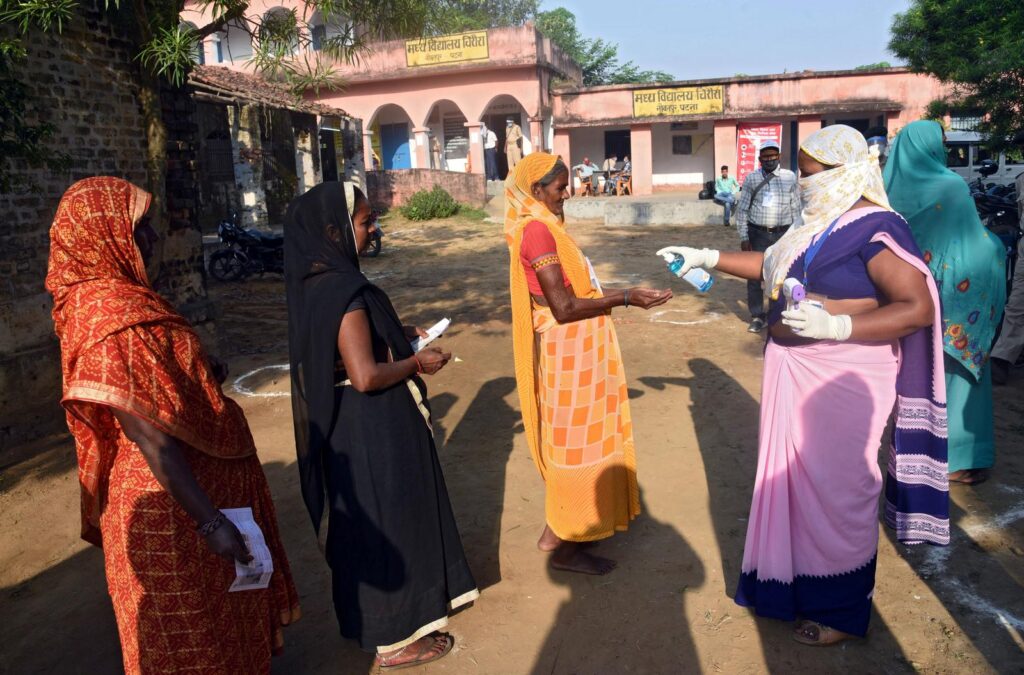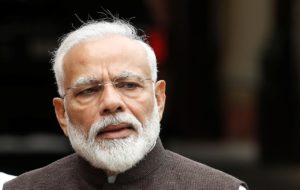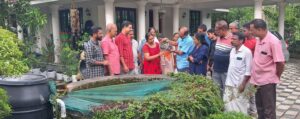Oppn Has Faith In SC, United On Bihar Electoral Rolls Issue: Congress

A woman sprays sanitiser on a voter's hand as she and others wait in a queue to cast their vote outside a polling booth during the state assembly election, amid the spread of the coronavirus disease, at a village on the outskirts of Patna, Bihar (Representative Image)
The Congress party, along with nine other opposition parties, has taken a significant step by approaching the Supreme Court to challenge what they describe as an “unconstitutional” and politically motivated revision of electoral rolls in Bihar. This united front highlights the growing concern among opposition forces that the Election Commission’s (EC) Special Intensive Revision (SIR) could disenfranchise millions of legitimate voters ahead of the upcoming assembly elections in the state.
At the center of this controversy is the timing and methodology of the SIR process, which the opposition argues is both legally questionable and practically chaotic. The EC initiated this revision just months before Bihar is expected to go to the polls, raising alarms in both rural and urban constituencies.
Congress general-secretary (organisation) K.C. Venugopal, one of the petitioners, called the SIR “blatantly unconstitutional” and accused the EC of acting under the influence of the ruling regime. He stated, “It has wreaked havoc across villages and towns of Bihar, giving crores of voters anxiety about whether their right to vote will be stolen. This is mass-scale rigging and mischief being carried out by the ECI,” he posted on X.
Echoing Venugopal’s sentiments, Congress media and publicity head Pawan Khera framed the legal challenge as a collective defense of democratic rights. “Today, the Indian National Congress, along with nine political parties, came together to file a challenge to the flawed and destructive Special Intensive Revision (SIR) being carried out by the ECI,” Khera emphasized. He highlighted the unity of purpose among opposition parties, stating, “The entire Opposition stands together to oppose an exercise that is guaranteed to disenfranchise a vast number of voters due to its malicious and mischievous methodology.” Khera concluded with the declaration “satyamev jayate” — truth alone triumphs.
Congress general-secretary Randeep Surjewala adopted a more combative tone in his post on X, questioning the integrity of the electoral process under the current government. “Democracy or BJP’s vote suppression mechanism? Bihar is asking, the country is asking!” he wrote. Surjewala provided a chronological rebuttal to the EC’s actions, noting that the final voter list for Bihar was updated in January 2025 and remained open to revision until June. Yet, without citing discrepancies or evidence of irregularities, the EC suddenly initiated a new verification process. “Without any proof, without any discrepancies, 7 crore voters now have to prove their Indian citizenship again,” he observed. “Those whose names were added after 2003 are being viewed with suspicion.”
He further pointed out that long-time voters, including those who have participated in elections for two decades, are now being asked to produce documentation of their identity, residency, and nationality. According to Surjewala, “This process called ‘Special Intensive Revision’ has neither any legal basis nor any mention in the rules. This term doesn’t even exist in electoral law.” Drawing a historical comparison, he noted that a similar exercise in 2003 was conducted over a year and applied uniform standards to all voters. In contrast, he claimed, the current effort is being rushed through in just 30 days under unclear and inconsistent guidelines. “The people of Bihar are being tested on the question of citizenship. Voters have been turned into suspected citizens. The Election Commission is evading answers.”
Surjewala concluded his post with a sharp cultural reference to the Mahabharata, likening the process to a manipulative scheme. “This isn’t democracy; this is Shakuni’s laboratory. This isn’t a voter list; this is a script written with political motives. Remember, everything will be remembered. Remember, democracy won’t be lost to Shakuni’s dice.”
On Monday, a bench of the Supreme Court, consisting of Justices Sudhanshu Dhulia and Joymalya Bagchi, agreed to hear a batch of petitions challenging the EC’s move. The urgency of the matter was highlighted by senior advocate Kapil Sibal, who appeared on behalf of RJD MP Manoj Jha. Sibal urged the court to issue notices to the EC, emphasizing the impracticality of completing such a massive revision exercise before elections expected in November. Joining Sibal, senior advocate and Congress leader Abhishek Manu Singhvi noted that the burden of proof under the SIR process could fall on nearly half of Bihar’s electorate. “There are around eight crore voters in the state, of which around four crore voters will have to submit their documents under the exercise,” he stated.
In defense of the revision, the Election Commission has justified the process as a necessary response to demographic changes, including rapid urbanization, youth reaching voting age, population migration, unreported deaths, and the alleged inclusion of illegal foreign nationals. The EC has assured the court that the process will comply with Article 326 of the Constitution and Section 16 of the Representation of the People Act, 1950, both of which govern qualifications and disqualifications for inclusion on electoral rolls.
However, critics argue that the EC’s explanations do not adequately address the key issues of legality, transparency, and timing. The invocation of security and demographic concerns, they contend, risks normalizing a process that could be used to selectively suppress votes.
This case is now set to test the judiciary’s role in safeguarding electoral integrity, especially in a politically charged state like Bihar, where electoral margins are often razor-thin and every voter counts. The outcome could have significant implications for the future of democracy in India, as the opposition seeks to protect the rights of voters against what they perceive as an encroachment on democratic processes.





